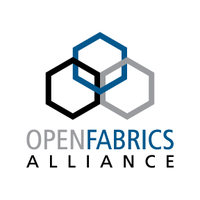- OpenFabrics Alliance
-
OpenFabrics Alliance 
OpenFabrics Alliance Official LogoFormation June 2004 Type Non-profit organization Website http://www.openfabrics.org/ The OpenFabrics Alliance is a non-profit organization that evangelizes remote direct memory access (RDMA) switched fabric technologies for server and storage connectivity. These high-speed data-transport technologies are used in high-performance computing facilities, in research and various industries.
The OpenFabrics Alliance aims to develop a unified, open-source software stack that supports the two major RDMA fabric technologies -- InfiniBand and iWARP (also known as RDMA over Ethernet). The software includes two packages, one that runs on Linux and FreeBSD and one that runs on Windows. The alliance worked with the two large Linux distributors—Novell and Red Hat—as well as Microsoft on compatibility with their operating systems.
Contents
History
Founded in June 2004 as the OpenIB Alliance, the organization originally developed an InfiniBand software stack for Linux. Initial funding for the Alliance was provided by the United States Department of Energy. The alliance released the first version of the OFED (OpenFabrics Enterprise Distribution) in 2005.
In 2005 the OpenIB Alliance announced support for Microsoft Windows. In 2006, the organization again expanded its charter to include support for iWARP, which is a transport technology that competes with InfiniBand. At that time that the alliance changed its name to the OpenFabrics Alliance. Subsequent releases have added support for iWARP and Windows.
In 2011, OFED stack was ported to FreeBSD and included in FreeBSD 9.
OpenFabrics Enterprise Distribution
A community of developers from hardware manufacturers, software vendors, system integrators, government agencies and academia continue[update] to work on OFED. The OpenFabrics Alliance provides architectures, software repositories, interoperability tests, bug databases, workshops, and BSD- and GPL-licensed code to facilitate development.
The OFED stack includes software drivers, core kernel-code, middleware, and user-level interfaces. It offers a range of standard protocols, including IPoIB (IP over InfiniBand[1]), SDP, SRP, iSER, RDS and DAPL (the Direct Access Programming Library). It also supports many other protocols, including various MPI implementations, and it supports many file systems, including Lustre and NFS over RDMA.
Interoperability testing
On June 25, 2007, the OpenFabrics Alliance announced the OFA-UNH-IOL Logo Program in partnership with the University of New Hampshire InterOperability Laboratory. The program enables manufacturers of InfiniBand and iWARP products to test and certify that their products support the OpenFabrics software stack, and test their compatibility with other products.
The alliance sponsors interoperability events at the University of New Hampshire. The test scenarios are available to the public, as are the test results for all products that earn the logo. During interoperability events, all participating companies have the opportunity to observe all tests run on all products.
Members
Corporate members of the OpenFabrics Alliance include Advanced Micro Devices, Appro, Chelsio Communications, Cisco Systems, Data Direct Networks, Flextronics, Hewlett Packard, IBM, Intel, LSI Corporation, Mellanox Technologies, NetEffect, Neterion, NetApp, NetXen, Oracle Corporation, QLogic, Silicon Graphics, Sun Microsystems, System Fabric Works, and Xsigo Systems.
Research members include:
Consulting members include the Ethernet Alliance, the InfiniBand Trade Association, Lamprey Networks, Ohio State University, and the University of New Hampshire InterOperability Laboratory. In 2007, Credit Suisse became the first financial-services firm to join the Alliance.
References
- ^ "Glossary". SGI InfiniteStorage Appliance Manager User's Guide. SGI. 2008-07-19. http://techpubs.sgi.com/library/tpl/cgi-bin/getdoc.cgi?coll=linux&db=bks&srch=&fname=/SGI_Admin/NASMGR_UG/sgi_html/go01.html. Retrieved 2008-10-01.
External links
Categories:- Computer memory
- Computer network organizations
Wikimedia Foundation. 2010.
